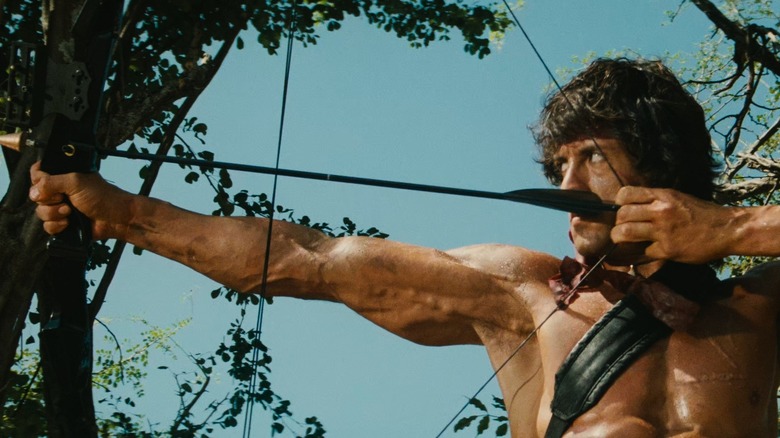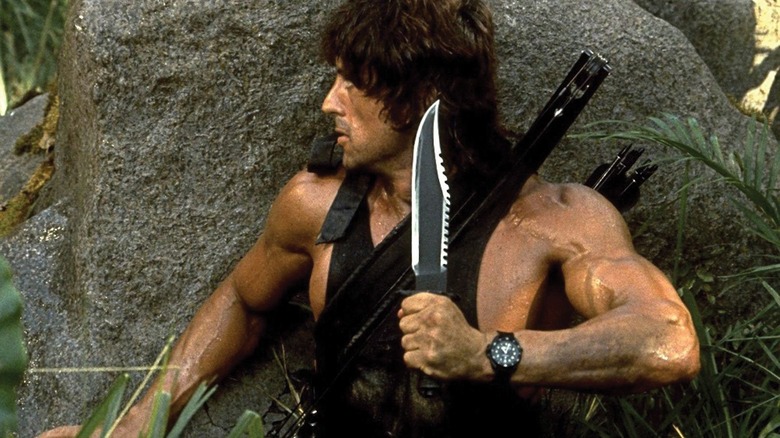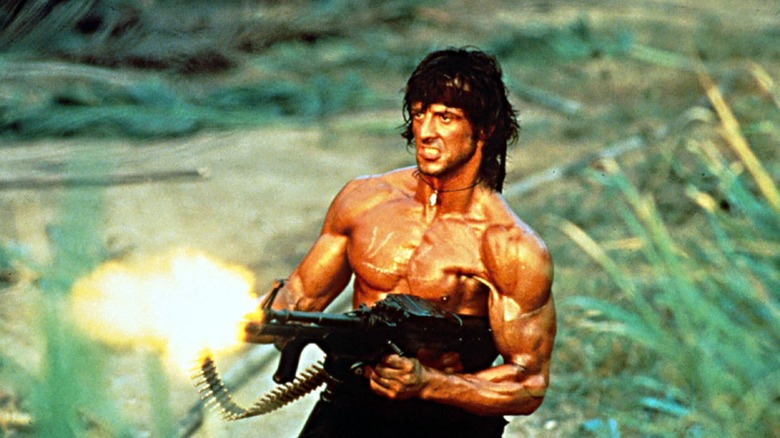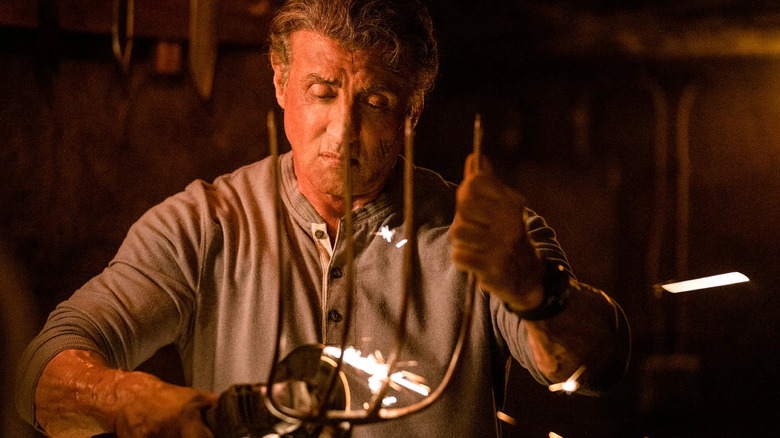Sylvester Stallone Doesn't Think Audiences Ever Understood Rambo
Ted Kotcheff's 1982 film "First Blood" may be noted for how downbeat it is. The lead character, John Rambo (Sylvester Stallone) is a tragic figure, a Vietnam veteran who finds that another one of his friends has died, and, on the way out of town, is accosted by a cruel sheriff (Brian Dennehy) who threatens him with charges of vagrancy. That he is eventually badgered back into trauma-induced "war mode" is presented as a tragedy in "First Blood," and while John Rambo was described as an ultra-efficient killing machine for the government, the audience's ambivalence about the Vietnam War made his soldierly skill seem like a useless vestige of an ill-advised conflict.
Only three years later, the tone of Rambo's life would change dramatically in George P. Cosmatos' "Rambo: First Blood Part II," a broad, clunky, propaganda-flavored actioner that audiences loved and critics hated. In "Part II," Rambo is tasked with returning to Vietnam to retrieve prisoners still be held there. A telling line of dialogue is when Rambo asks if America gets "to win this time." The entire picture is devoted to symbolically — using cinema as a tool of jingoistic justice — winning the Vietnam war and restoring America's place in the world as an unbeatable war machine. Rambo is the best tool to come out of the military machine's toolbox. The same can perhaps be said of Peter MacDonald's 1988 sequel "Rambo III."
This interpretation of Rambo as a symbol for right-wing, Reagan-era military might is common among critics, and it's difficult to discuss John Rambo without acknowledging it.
'He was never proactive'
Someone who disagrees with the common critical analysis of Rambo, however, is Stallone himself. Back in a 1998 interview with Cigar Aficionado Magazine (long before the production of "Rambo" and "Rambo: Last Blood"), Stallone expressed frustration with the common interpretation of a character he co-created (Stallone is a co-screenwriter on all five of the Rambo movies). Stallone argued that John Rambo could not be a tool for the government, as he never expressed any agency, nor was he financially compensated for his actions.
"You know, people never really understood Rambo. I shouldn't say that; a certain faction dismissed Rambo as a violent tool for the right wing. Whereas Rambo was never antigovernment, [he] worked on his own, received no financial remuneration and was always in the business of extracting prisoners at the cost of his own life. I did not understand the criticism. His was much more of a martyr position than one of being proactive; he was never proactive."
Stallone is correct on that detail: Rambo was typically employed as a free agent instead of tapped as an enlisted soldier. Stallone's argument that Rambo is a martyr certainly holds true when looking at only "First Blood." It's when the two following sequels are considered that Rambo transforms from a martyr into a military superhero. Stallone points out that Rambo was not living in suburban bliss, waiting for the government to call, but a lonely hermit, often found keeping to himself in the jungle, undone by trauma and unable to socialize.
They came to him
For Stallone, this was plenty of evidence to suggest Rambo's willingness to stay politically neutral.
"He was happy to stay in the jungle. If you noticed, every time they came to him. But that is not the way it was interpreted. Through political cartoons and this interpretation, Rambo is as close as we get to Tyrannosaurus Rex, this Genghis Kahn of the Third World, but please, that's not true."
The Cigar Aficionado interviewer, Gordon Mott, also brings up the propagandistic nature of Rambo, addressing open and legitimate concerns some critics had about "First Blood Part II" being used as a way to shift the public's perception about the Vietnam war. One should recall that 1985 was in the middle of Ronald Reagan's tenure as president, and the United States was sending military support to wars in El Salvador, Guatemala, and Nicaragua. These wars always smelled fishy, and it would eventually come out that the U.S. was openly supporting acts that would be deemed terrorism. Eventually, the U.S. General Accounting Office would shut down an arm of Regan's Office of Public Diplomacy for engaging "in prohibited, covert propaganda activities designed to influence the media and the public to support the Administration's Latin American policies." It's easy to see Rambo as being a direct part of that. The government wasn't authoring Rambo scripts, but the movies' gung-ho depictions of American interference were certainly in keeping with actual propaganda.
Rambo vs. Platoon
Stallone felt this comparison was unfair, seeing John Rambo as simply being blunter than some of his more critical, downbeat war movie contemporaries.
"That's what happened. Rambo really became a tool of right-wing imperialism as opposed to James Bond, who was much more liberal in his approach. When ['First Blood'] came out, there were other films like 'Platoon' and 'Coming Home' and 'Born on the Fourth of July,' which threw Rambo into an even further Black Knight situation, where he was the aggressor and Grim Reaper"
It also didn't help that Rambo, unlike the heroes of those other movies, was a large, over-muscled, beast of a man. His physical prowess set him apart from the more commonly proportioned soldiers in Oliver Stone movies.
"I understand it, because Rambo was such a physical character; it's tough for us to think he's vulnerable by any means. Still, ['First Blood'] I'm very proud of. The second one went into a whole different exploratory area; it became cartoonish. Bigger than life. That's where it went into Joseph Campbell. You know, the creation of a mythic hero because obviously what he did could never be accomplished. But the first one could. He suffered a lot worse in the first one and survived."
By the time "Rambo: Last Blood" came out in 2019, the Campbellian myth had long since overtaken any sense of personal tragedy or martyrdom, depicting John Rambo as the final warrior willing to fight against evil Mexican drug cartels, one of the many villains du jour of the Trump administration. Stallone holds that Rambo is not a superhero or a badass, even after all the criticism of a generation ago.
Those who have seen his movies may disagree.



